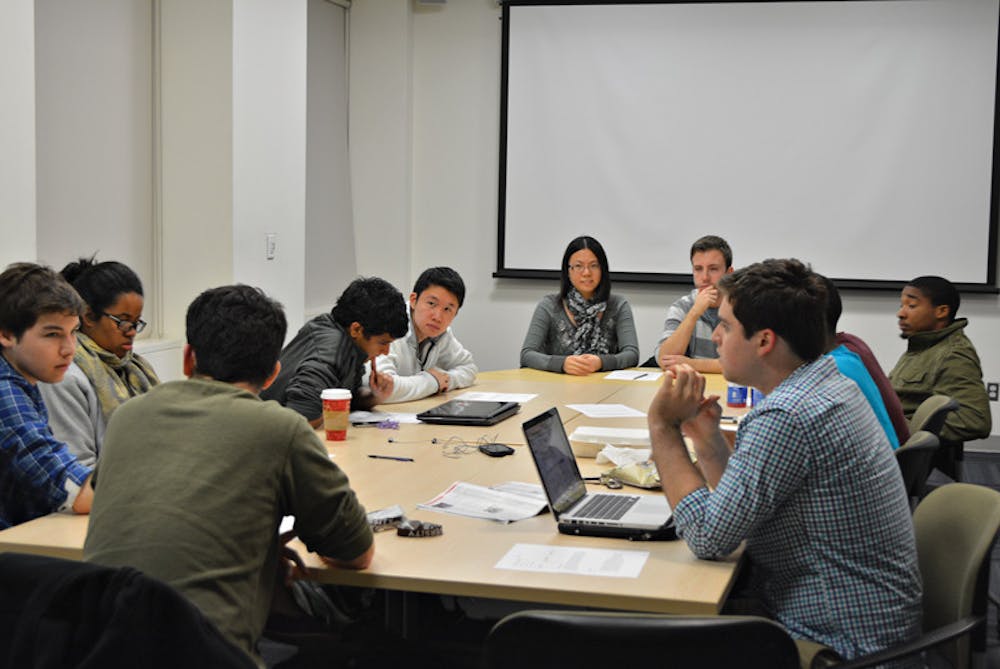Funding for student groups has seen vast changes this year, with finances now going toward service groups and covering food at events.
This semester, the new Service Group Funding Board began allocating funds to service groups that meet its criteria. Last spring, the Undergraduate Finance Board started covering up to half of the cost of food at events.
The policy changes regarding service groups and food mark “two big milestones” for student group funding, said Leila Veerasamy ’15, UFB chair.
Some student group leaders told The Herald they have benefitted from the new policies, while others criticized the policies or reported still feeling underfunded.
In the past, service groups have struggled to operate without official University funds. But starting this semester, these groups, designated Category S, have been able to apply for $200 of baseline funding from the Service Group Funding Board.
The board results from a code change to the Undergraduate Council of Students’ constitution last spring. The change called for an entity separate from UFB that gives money to service groups to “further their missions.”
Though UFB doles out funds to Category 1, 2 and 3 student groups, it has historically refrained from funding Category S groups.
The previous system did not reflect Brown students’ engagement in the community, said Alex Sherry ’15, UFB vice chair. “There was a gap in the system, and the goal was to bridge that gap.”
UCS Vice President Sam Gilman ’15, who helped write the code change, called the funding strategy “a moral issue.”
“We were saying what students do on Brown’s campus is more important than what students do in the community,” he added.
Seven service groups received $200 each from the board this semester, said Noelle Spencer ’14, chair of the board.
The board’s funds will have a “major impact on helping Brown students interact with the Providence community in a larger way,” she said.
Julia Lynford ’14, co-president of Active Minds, a service group that aims to reduce the stigma surrounding mental health, said she was “thrilled” her group received funds.
“We can do so much more now … that wouldn’t have been feasible last year,” she said, adding that Active Minds is already planning to hold a workshop, show movies and bring in speakers next semester.
But some service group leaders criticized the board for its lack of publicity.
The board sent information about applying for funding to service group leaders via MyGroups at the start of the semester, Spencer said.
Alzheimer’s Activists was incorrectly listed on MyGroups as Category 1, and its leaders did not find out they could apply for funds until the deadline had passed, said Tara Torabi ’15, co-president of Alzheimer’s Activists.
“They should do more to make funding for service groups known, like having information available online,” she said.
Jana Foxe ’16, a community fellow for Housing Opportunities for People Everywhere, said she had not heard of the board.
Foxe said she wished she had known about the board, despite the fact that it cannot offer HOPE funding because it is a Swearer Center for Public Service group, not a Category S group.
“As a chair of a service group, it’s important that we’re contacted about such funding opportunities,” she said.
Student groups have historically been responsible for funding food for events, but UFB began covering up to 50 percent of the costs last spring.
Food can be “integral to events” such as dinners or receptions after lectures, Veerasamy said.
The new policy will benefit cultural groups the most, since their events tend to center around food, Sherry said.
Virginia-Eirini Kilikian GS, treasurer of the Hellenic Students Association, said she thinks the new policy will solve her group’s financial concerns.
“The real issue has been food,” she said, noting that roasting a lamb on a spit for Easter has cost the group about $500 in the past. “Other than that, all of the money we get is perfect.”
The policy “opens up a lot of what we can do,” said Gayatri Mehra ’14, president of the South Asian Students Association.This year, SASA was able to reduce the ticket price for its annual Dinner Dance in October by half, since ticket sales did not have to offset the expense of food, she said.
“But it would be great if UFB could fund 100 percent of the cost, because you still have to raise money to cover the other 50 percent,” she said, adding that SASA still feels somewhat constrained due to a general decrease in UFB funding in recent years.
Looking ahead, the board will assess the effects of the food policy and decide whether to raise the 50 percent benchmark, Sherry said.
“We needed to be a little conservative at first, because we didn’t know how much demand there would be,” he said. “We’re going to re-evaluate it after this year.”

ADVERTISEMENT




